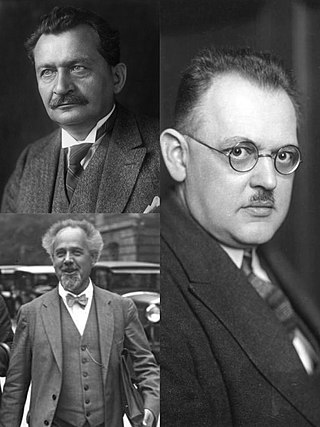December 1924 German federal election
From Wikipedia, the free encyclopedia
Federal elections were held in Germany on 7 December 1924 to elect the third Reichstag of the Weimar Republic.[1][2][3]
| |||||||||||||||||||||||||||||||||||||||||||||||||||||||||||||||||||||||||||||||||||||
All 493 seats in the Reichstag 247 seats needed for a majority | |||||||||||||||||||||||||||||||||||||||||||||||||||||||||||||||||||||||||||||||||||||
|---|---|---|---|---|---|---|---|---|---|---|---|---|---|---|---|---|---|---|---|---|---|---|---|---|---|---|---|---|---|---|---|---|---|---|---|---|---|---|---|---|---|---|---|---|---|---|---|---|---|---|---|---|---|---|---|---|---|---|---|---|---|---|---|---|---|---|---|---|---|---|---|---|---|---|---|---|---|---|---|---|---|---|---|---|---|
| Registered | 38,987,324 ( 1.6%) | ||||||||||||||||||||||||||||||||||||||||||||||||||||||||||||||||||||||||||||||||||||
| Turnout | 78.8% ( 1.4pp) | ||||||||||||||||||||||||||||||||||||||||||||||||||||||||||||||||||||||||||||||||||||
| |||||||||||||||||||||||||||||||||||||||||||||||||||||||||||||||||||||||||||||||||||||
| |||||||||||||||||||||||||||||||||||||||||||||||||||||||||||||||||||||||||||||||||||||
The elections took place just six months after the previous elections in May due to the political impasse following the passage of the Dawes Plan. The result was a decline in strength for the parties of the far right and far left, the Nazi Freedom Party and Communists, who lost 18 and 17 seats respectively. The Social Democratic Party (SPD) made the largest gains, rising to 26%, followed by the radical nationalist German National People's Party (DNVP). The Catholic Centre Party, conservative German People's Party (DVP), and German Democratic Party (DDP) also saw a small upswing.[3]
Following the elections, the balance of power lay with the DVP, who announced they would only join a government of the bourgeois right. This time, negotiations with the DNVP were successful, and in January a new majority cabinet was formed under Hans Luther – an independent close to the DVP – as a coalition between the Centre Party, DNVP, DVP, and Bavarian People's Party.[3] For the following three years, until the collapse of the fourth Marx cabinet in February 1928, Germany was governed by cabinets of this conservative orientation.
Electoral system
The Reichstag was elected via party list proportional representation. For this purpose, the country was divided into 35 multi-member electoral districts. A party was entitled to a seat for every 60,000 votes won. This was calculated via a three-step process on the constituency level, an intermediary level which combined multiple constituencies, and finally nationwide, where all parties' excess votes were combined. In the third nationwide step, parties could not be awarded more seats than they had already won on the two lower constituency levels. Due to the fixed number of votes per seat, the size of the Reichstag fluctuated between elections based on the number of voters and turnout.[4] The voting age was 20 years.[5]
Results
 | ||||||
|---|---|---|---|---|---|---|
| Party | Votes | % | +/– | Seats | +/– | |
| Social Democratic Party | 7,881,041 | 26.02 | +5.50 | 131 | +31 | |
| German National People's Party | 6,205,802 | 20.49 | +1.04 | 103 | +8 | |
| Centre Party | 4,118,849 | 13.60 | +0.23 | 69 | +4 | |
| German People's Party | 3,049,064 | 10.07 | +0.87 | 51 | +6 | |
| Communist Party of Germany | 2,709,086 | 8.94 | −3.67 | 45 | −17 | |
| German Democratic Party | 1,919,829 | 6.34 | +0.69 | 32 | +4 | |
| Bavarian People's Party | 1,134,035 | 3.74 | +0.51 | 19 | +3 | |
| National Socialist Freedom Movement | 907,242 | 3.00 | −3.55 | 14 | −18 | |
| Economic Party of the German Middle Class | 692,963 | 2.29 | +0.58 | 12 | +5 | |
| Agricultural League | 500,525 | 1.65 | −0.31 | 8 | −2 | |
| Bavarian Peasant's and Middle Class Party | 312,442 | 1.03 | +0.37 | 5 | +2 | |
| German-Hanoverian Party | 261,549 | 0.86 | −0.23 | 4 | −1 | |
| German Social Party–Reichsbund für Aufwertung | 159,115 | 0.53 | −0.61 | 0 | −4 | |
| Independent Social Democratic Party | 98,842 | 0.33 | −0.47 | 0 | 0 | |
| German Revaluation and Reconstruction Party | 81,944 | 0.27 | New | 0 | New | |
| Polish People's Party | 81,700 | 0.27 | −0.07 | 0 | 0 | |
| Christian Social People's Community | 41,530 | 0.14 | −0.29 | 0 | 0 | |
| Free Economy Union F.F.F. | 38,923 | 0.13 | +0.01 | 0 | 0 | |
| Revaluation and Reconstruction Party (RWV 23) | 33,656 | 0.11 | New | 0 | New | |
| Party for People's Welfare | 32,496 | 0.11 | New | 0 | New | |
| Haeusser Alliance | 9,747 | 0.03 | −0.05 | 0 | 0 | |
| Wendish People's Party | 5,585 | 0.02 | −0.02 | 0 | 0 | |
| Schleswig Club | 5,134 | 0.02 | −0.01 | 0 | 0 | |
| German Christian People's Party | 4,322 | 0.01 | New | 0 | New | |
| Deutschvölkische Reichspartei | 3,405 | 0.01 | New | 0 | New | |
| Masurian Union | 542 | 0.00 | 0.00 | 0 | 0 | |
| Reevaluation and Reconstruction Party | 478 | 0.00 | New | 0 | New | |
| Tenants' Party | 246 | 0.00 | New | 0 | New | |
| Total | 30,290,092 | 100.00 | – | 493 | +21 | |
| Valid votes | 30,290,092 | 98.65 | ||||
| Invalid/blank votes | 414,934 | 1.35 | ||||
| Total votes | 30,705,026 | 100.00 | ||||
| Registered voters/turnout | 38,987,324 | 78.76 | ||||
| Source: Gonschior.de | ||||||
References
Works cited
Wikiwand - on
Seamless Wikipedia browsing. On steroids.









